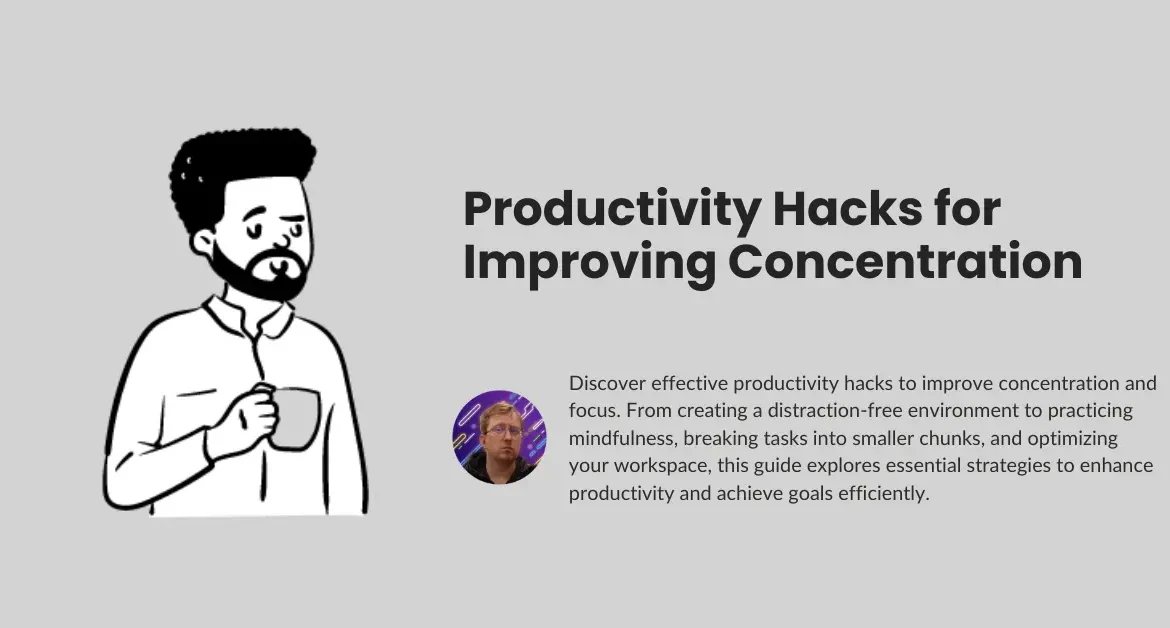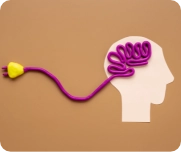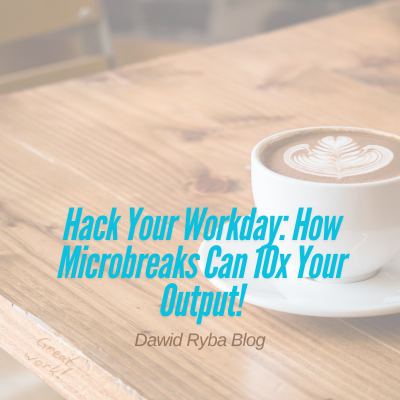
Productivity Hacks for Improving Concentration

Concentration is a crucial factor in achieving productivity. In today’s world, distractions are everywhere, and keeping our attention focused can often feel like a challenge. However, being able to concentrate on a task without getting sidetracked is key to working effectively and efficiently. The more we can improve our concentration, the more productive we can become, allowing us to complete tasks in less time and with greater quality. Fortunately, there are several productivity hacks designed to help us strengthen our concentration and make the most of our time.
In this guide, we will delve into a range of strategies to enhance concentration, covering everything from creating the right environment to maintaining good health habits. By exploring these strategies in detail, you’ll gain insights into how to increase your focus, manage your time more effectively, and ultimately reach your goals more efficiently.
The Importance of Concentration in Productivity

Concentration allows us to give our full attention to one task at a time, reducing the likelihood of mistakes and increasing our speed. Without focus, tasks take longer to complete, and errors become more common, leading to frustration and even burnout. Concentration is the cornerstone of productivity—it enables us to finish tasks faster and with greater accuracy, boosting both our output and satisfaction.
Concentration isn’t just about ignoring distractions; it’s also about training your brain to stay in the present moment. When we concentrate, we are fully engaged, using our cognitive resources to their fullest potential. This engagement enhances memory, problem-solving skills, and creativity, making concentration a powerful tool for personal and professional growth.
Let’s explore the productivity hacks that can help you improve your concentration.
Create a Distraction-Free Environment

The environment in which we work has a major impact on our ability to concentrate. When distractions are minimized, it’s easier to focus on the task at hand without being pulled away by unrelated thoughts or interruptions. Here are some strategies for creating a distraction-free workspace:
.
Find a Quiet Place to Work
Working in a quiet location reduces background noise that can interfere with concentration. If possible, find a room or area where interruptions are minimized. If you work in a noisy environment, consider using noise-canceling headphones or earplugs to block out external sounds. Creating a boundary between yourself and potential distractions is essential for focus.
Silence Digital Notifications
Smartphones, computers, and other devices are constantly vying for our attention with notifications, reminders, and alerts. These interruptions, even if brief, can disrupt concentration and pull us out of a productive state. Turn off or silence your devices during work hours or use “Do Not Disturb” settings to eliminate unnecessary alerts.
Limit Visual Clutter
Cluttered screens and open tabs on your computer can create mental clutter, making it difficult to stay focused. Close unnecessary tabs and only keep the essential applications open to maintain visual simplicity. A clean, organized workspace minimizes distractions and helps maintain a focused mindset.
Use Music Mindfully
Some people find that instrumental music or background sounds can help them concentrate. This is because rhythmic sounds or ambient noise can create a barrier against distractions, allowing you to immerse yourself in your work. If music helps you, choose options without lyrics, as lyrics can be distracting. Experiment with different types of music to find what best supports your focus.
Break Tasks into Smaller Chunks
Large tasks can be overwhelming, and the sheer scope of a big project can make it difficult to get started. Breaking tasks into smaller, manageable parts can make them feel more achievable, which encourages concentration and keeps motivation high. Here’s how to make large projects more approachable:
Divide and Conquer
Divide big tasks into smaller steps. For instance, if you’re writing a report, start by researching, then outline, draft, and edit as separate stages. Each stage is a smaller milestone, allowing you to focus on one step at a time without getting bogged down.
Set Clear Goals for Each Task
Give yourself specific, achievable goals for each segment of your project. By setting objectives, you create a roadmap that helps you stay on track and measure your progress. Clear goals also provide a sense of direction, making it easier to concentrate and stay motivated.
Celebrate Small Wins
Completing smaller chunks of a large task can give you a sense of accomplishment. Celebrate these small victories—acknowledging progress boosts motivation, reinforces focus, and encourages continued productivity. This positive reinforcement is a powerful way to maintain momentum as you work toward larger goals.
Prioritize and Plan
Productivity thrives on planning and prioritizing. When you know what needs to be done and in what order, it’s easier to focus and avoid getting sidetracked by less important tasks. Effective prioritization ensures that the most important tasks are given the most attention, especially when your energy levels are high.
Create a Daily To-Do List
Begin each day by listing the tasks you need to complete. Rank these tasks by importance, urgency, or deadlines. This list serves as a roadmap for the day, giving you a clear sense of what needs to be accomplished and in what order.
Tackle Challenging Tasks First
Identify tasks that require the most concentration and tackle them first, ideally when your mind is freshest. Known as the “eat the frog” method, this approach encourages you to face your toughest challenges head-on. Completing challenging tasks early frees up your energy for less demanding tasks later in the day.
Avoid Multitasking
While multitasking may seem efficient, it actually divides your attention, reducing your ability to concentrate fully on any one task. Focusing on one task at a time, also known as “single-tasking,” allows for deeper concentration, which leads to higher quality work and faster completion times.
Practice Time Blocking
Time blocking is an effective way to manage your day and ensure that you stay focused on one task at a time. By setting specific blocks of time for different tasks, you create structure and reduce the likelihood of switching between activities impulsively.
Schedule Blocks for Each Task
Dedicate specific time slots for different tasks and activities. For example, allocate an hour for checking emails, followed by two hours for working on a project. Stick to these blocks as closely as possible, and avoid allowing other tasks to encroach on the scheduled time.
Focus Solely on the Task at Hand
During each time block, concentrate solely on the designated task. Resist the urge to check your phone, browse the internet, or attend to other tasks. By giving your full attention to one activity, you can achieve a deeper level of concentration and complete tasks more efficiently.
Take Breaks Between Blocks
After each time block, take a short break. Breaks are essential for recharging, and they allow your mind to rest before moving on to the next task. Use this time to stretch, take a quick walk, or practice deep breathing to reset your focus and energy.
Practice Mindfulness and Deep Breathing
Mindfulness and relaxation techniques, such as deep breathing, help calm the mind and improve focus. When we’re relaxed, it’s easier to concentrate because our minds are less likely to wander.
Try Mindfulness Meditation
Mindfulness meditation trains you to bring your attention to the present moment. Even a few minutes of meditation each day can help strengthen your concentration and reduce stress. There are many apps available that guide you through short mindfulness sessions, making it easy to start this practice.
Use Deep Breathing Techniques
Deep breathing exercises improve oxygen flow to the brain, which helps boost concentration. Try inhaling slowly through your nose, holding your breath for a few seconds, and then exhaling slowly through your mouth. This practice calms the nervous system, lowers stress, and enhances focus.
Engage in Regular Physical Exercise
Physical activity reduces stress and improves circulation, both of which can positively impact concentration. Exercise releases endorphins, chemicals that improve mood and make it easier to focus. Regular exercise doesn’t have to be intense—a short walk or light stretching can be enough to refresh your mind and improve concentration.
Optimize Your Workspace
The workspace you choose has a direct impact on your focus and productivity. A well-organized, comfortable, and visually appealing environment can support concentration, while a cluttered or uncomfortable space can be distracting.
Keep Your Workspace Organized
A clutter-free workspace reduces mental clutter. Organize your desk, store items in their designated places, and clear away unnecessary papers or objects. A tidy workspace creates a calming environment, making it easier to focus on work.
Ensure Good Lighting and Ergonomics
Proper lighting reduces eye strain, and a comfortable seating arrangement prevents physical discomfort, both of which contribute to a more focused work environment. Use ergonomic furniture and equipment to maintain good posture, and arrange your space to avoid strain on your eyes, neck, and back.
Take Care of Your Health
Health is directly linked to concentration and productivity. When you take care of your physical and mental health, it’s easier to focus and accomplish your tasks effectively.
Get Enough Sleep
Sleep is essential for cognitive function, including memory and concentration. When we don’t get enough sleep, our ability to concentrate suffers, and productivity declines. Aim for seven to eight hours of quality sleep each night to improve focus and reduce mental fatigue.
Eat a Brain-Boosting Diet
Nutrition plays a significant role in brain health. A balanced diet rich in fruits, vegetables, whole grains, and omega-3 fatty acids supports cognitive function. Foods like leafy greens, berries, nuts, and fish are known for their brain-boosting properties. Eating well fuels your brain and helps maintain concentration throughout the day.
Stay Hydrated
Dehydration can lead to fatigue and impaired concentration. Drinking water throughout the day is essential for keeping your mind sharp and maintaining energy levels. When you’re hydrated, it’s easier to focus and stay alert.
Final Thoughts
Improving concentration is a powerful way to boost productivity, helping us achieve our goals with less effort and time. By creating a distraction-free environment, breaking down tasks, prioritizing, using time blocking, practicing mindfulness, optimizing our workspace, and taking care of our health, we can build a foundation for better concentration. These productivity hacks are not one-size-fits-all; they are flexible strategies that can be adjusted to fit your unique needs and preferences.
The journey to improved concentration is about consistency and finding what works best for you. Try incorporating these hacks into your daily routine, observe the impact, and make adjustments as needed. With dedication and a proactive approach, you can strengthen your focus, accomplish more, and move closer to achieving your personal and professional aspirations.
FAQ
Why is concentration important for productivity?
Concentration allows us to focus on tasks without getting easily distracted. When we can concentrate, we accomplish more in less time, leading to increased productivity.
How can I create a distraction-free environment?
Find a quiet place to work, silence your phone, close unnecessary tabs and applications on your computer, and use noise-canceling headphones or instrumental music to minimize distractions.
How can breaking tasks into smaller chunks improve concentration?
Large tasks can be overwhelming and make it difficult to concentrate. Breaking them down into smaller, manageable tasks helps us focus on completing them one at a time, boosting motivation and maintaining concentration.
How can time blocking help improve concentration?
Time blocking involves allocating specific time blocks for different tasks. By focusing solely on the designated task during each time block and avoiding distractions, concentration is enhanced.
Why is mindfulness important for concentration?
Mindfulness techniques, such as deep breathing and meditation, calm the mind and improve concentration. They help us stay present and focused on the task at hand.
How can optimizing my workspace contribute to better concentration?
Keeping your workspace clean, organized, and clutter-free, ensuring proper lighting, and using ergonomically designed furniture and equipment reduce physical distractions and enhance focus.
How does taking care of my health affect concentration?
Getting enough sleep, eating a balanced diet, and staying hydrated support brain function, reduce mental fatigue, and improve cognitive abilities, including concentration.

